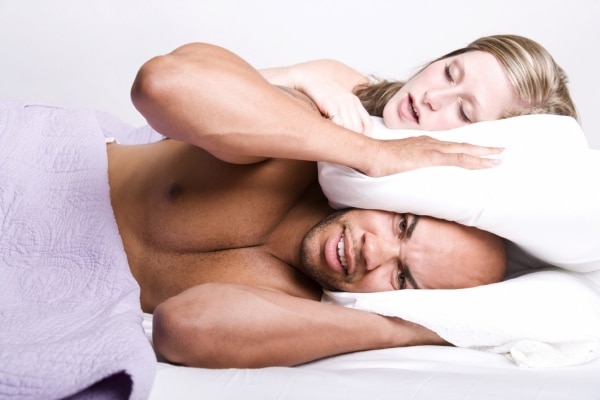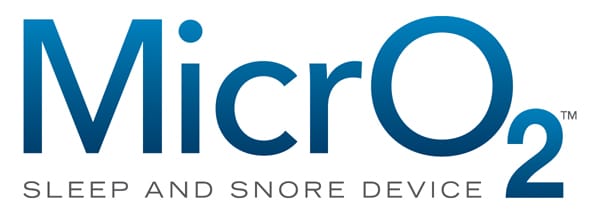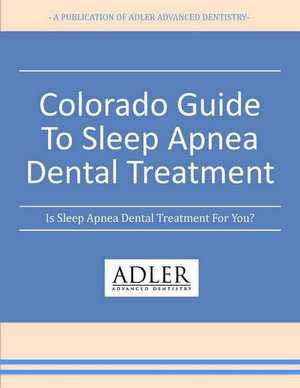If you’ve been told by a spouse or family member that you frequently snore and sometimes gasp for air during the night, you may be suffering from sleep apnea. Sleep apnea is a disorder in which your airway becomes fully or partially blocked while you sleep, causing you to stop breathing during the night. When this happens your lungs don’t receive the oxygen they need to maintain a healthy body.

Dr. Michael Adler understands the frustration that can result from this disorder and has extensive training and experience to help you get a restful night’s sleep. While sleep apnea is not an oral health issue, it can be treated using advanced, noninvasive oral appliances. As a holistic dentist, Dr. Adler is pleased to offer this alternative and other options to those suffering from mild to moderate sleep apnea.
If you or a loved one are suffering from sleep apnea and want to learn more about the treatments Dr. Adler offers, contact Adler Advanced Dentistry at 303-449-1119 today to schedule a consultation. We proudly provide services to those who live in Boulder and all nearby Front Range communities in Colorado.
"Great people, innovative care. Actively helping me with my sleep apnea/TMJ after many dead ends. I am so grateful."
Obstructive Sleep Apnea
Obstructive sleep apnea (OSA) is the most common form of the condition. According to the American Academy of Dental Sleep Medicine, over 180 million people suffer from mild to severe obstructive sleep apnea, with nearly 75 percent of those cases undiagnosed.
Obstructive sleep apnea can happen if you have a problem with your jawbone, if your tongue or throat muscles relax during sleep, or if you have large tonsils or adenoids that press down on your airway. When your airway is blocked, the muscles in your diaphragm and chest need to work harder than normal to pull in air.
When this occurs, you may gasp for air up to 60 times a night, causing considerably less oxygen to be delivered to your vital organs. This causes your brain to send signals for your body to momentarily awaken to take in air. OSA affects millions of Americans, and if left untreated, can lead to restless sleep and serious health issues such as:
- High blood pressure
- Diabetes
- Depression
- Coronary heart disease
- Stroke
- Heart failure
- Type 2 diabetes
- Fibromyalgia
- Liver problems
- Metabolic syndrome
Sleep Apnea Symptoms
If you or a loved experience excessive or disruptive snoring followed by choking or gasping noises during the night, these may be signs of sleep apnea. Snoring is caused by your tongue falling backward during sleep and partially or fully blocking the airway. The body then struggles to obtain air which causes vibrations or snoring. As this happens, the blocked airway interferes with breathing and even causes long periods of breath cessation during your sleep.
Another cause of OSA can be an imbalanced jaw. If your jaw is unable to relax in its natural position, either because of ground down or missing teeth, tension in the muscles in the jaw can lead to disturbed sleep patterns and loud excessive snoring. It may be hard to determine if you experience disruptive snoring as a result of any of these conditions but there are other symptoms that may indicate you have sleep apnea, including:
- Frequent morning headaches
- Waking with a dry mouth or a sore throat
- Excessive daytime fatigue
- Memory and concentration problems
- Irritability and mood swings
- Insomnia
- Repeatedly waking and gasping for air
- Decreased sex drive and libido
- Tossing and turning during sleep
- High blood pressure
- Impotence
- Heartburn and acid reflux
- Irregular heartbeats
Children can also suffer from this condition and may exhibit symptoms such as:
- Excessive snoring
- Hyperactivity or problems with attention during the day
- Restless sleep and waking often during the night
- Bed-wetting
- Don’t grow as fast as other children their age
Any of the above symptoms, alone or in combination with snoring, should prompt a sleep apnea evaluation if they continue for longer than a few weeks. Left untreated, sleep apnea may increase risks for serious health conditions.
Dr. Adler can discuss this with you in greater detail and help assess your risks during your sleep apnea treatment consultation.
Sleep Apnea Risk Factors
Nearly anyone can be diagnosed with obstructive sleep apnea, but there are certain factors that may lead to a higher likelihood of developing the condition. Common obstructive sleep apnea risk factors include both things that you can change and others that you cannot change.
Risk factors you cannot change:
- Age: Most common in people 30 or older
- Gender: More common in men
- Genetics: A family history of sleep apnea
- Ethnicity: Hispanics and Pacific Islanders have the greatest risk while African-Americans tend to get sleep apnea younger
- Deformities of spine: Conditions such as scoliosis may interfere with breathing
- Head and face abnormalities: Conditions such as Marfan’s Syndrome and Down Syndrome may increase risk
- Menopause: Sleep apnea tends to occur more in women who have been through menopause
Risk factors you can change:
- Obesity: Factor most likely to cause sleep apnea
- Neck circumference: Extra tissue around the neck may increase risk
- Enlarged nose, mouth, or throat tissue: Enlarged tissue can block airways while you sleep. Surgery may help correct blockage
- Bone deformities: Deformities in the nose, mouth, jaw, or throat may interfere with breathing. Surgery may help correct deformities
- Alcohol or medicine: Drinking alcohol or taking certain medicines (sleeping pills, sedatives) at night may increase your risk
- Smoking: Nicotine relaxes muscles which may block airways
Diagnosis and Treatment of Sleep Apnea
If you believe you may be at risk or are suffering from sleep apnea, Adler Advanced Dentistry can help. On your first visit, Dr. Adler will conduct a dental exam to confirm your oral health status. He’ll then create an at-home sleep study, in which a wearable, wireless physiological recorder called the Medibyte Jr., is worn around the chest during sleep. This device will measure your:
- Blood oxygen saturation
- Pulse rate
- Airflow
- Respiratory effort
- Snoring levels
- Body movement
- Body position
After you drop off the recorder, the data is transferred to a team of sleep specialists who then interpret the data to determine the severity of your sleep apnea.
MicrO2 Appliance
For those who have been diagnosed with obstructive sleep apnea and need further assistance beyond lifestyle changes, Dr. Adler offers a custom-made oral appliance, called the MicrO2 appliance, to treat mild to moderate sleep apnea.

The MicrO2 appliance is an adjustable device that works by pulling the jaw forward so that the airway is in a position that keeps the surrounding muscles comfortable. The appliance uses the smallest amount of material possible, reducing bulkiness in the mouth, creating a more comfortable experience.
Based on a sleep physician’s diagnosis, and if you’re a candidate for the MicrO2 appliance, Dr. Adler brings you back into the office to take dental impressions for your device. Once your custom-made device is ready, you’ll be properly educated on how to use and care for it. Dr. Adler then conducts a follow-up sleep study, once again in your home, to determine the effectiveness of the device and to make adjustments to improve its results.
CPAP Machine
Another option for treating obstructive sleep apnea, and the most common method, is called the Continuous Positive Airway Pressure, or CPAP machine, which assists your breathing while you sleep to ensure your airways don’t close. This machine is effective in alleviating the dangerous breathing pattern associated with sleep apnea.
Unfortunately, many patients are uncomfortable being hooked up to a machine all night, leading to poor patient compliance. Dr. Adler finds that his alternative treatment method of using the MicrO2 appliance has an exceptional level of patient acceptance and effectiveness. The appliance is also backed by a large body of clinical research.
Why Early Diagnosis and Screening Are Essential
Identifying sleep apnea in its early stages allows for timely management, helping to prevent symptoms from affecting your quality of life. When untreated, sleep apnea can result in persistent fatigue, mood shifts, and an increased risk of accidents due to decreased alertness. Dr. Adler has specialized training to detect early indicators of sleep apnea, including loud snoring, frequent nighttime awakenings, and daytime drowsiness—symptoms that often go overlooked.
Adler Cosmetic & Family Dentistry offers initial screenings to help assess your risk of sleep apnea. If signs are present, Dr. Adler may recommend an at-home sleep study to determine the severity of your condition. At our clinic, we offer custom-designed oral appliances for patients with mild to moderate sleep apnea, which work by gently shifting the jaw to keep the airway open throughout the night. These appliances offer an effective, comfortable alternative to CPAP machines, making them an excellent option for many patients.
The Toll of Sleep Apnea on Mental Health and Cognitive Abilities
Beyond physical health, sleep apnea significantly impacts mental well-being and cognitive function. Without restorative sleep, many patients experience memory problems, reduced concentration, mood swings, and an increased risk of anxiety and depression. Because sleep apnea repeatedly interrupts the sleep cycle, the brain misses out on critical time to rest and recharge, impairs focus and mental clarity.
Treatment for sleep apnea, such as a custom oral appliance, can improve sleep quality by reducing interruptions throughout the night. Many patients notice improved physical health, better concentration, a stable mood, and less stress. Dr. Adler’s holistic approach to treatment considers both the cognitive and physical effects of sleep apnea, helping patients feel more refreshed, mentally sharp, and energized throughout the day.
Long-Term Health Risks of Untreated Sleep Apnea
Untreated sleep apnea can have severe long-term health consequences. Repeated oxygen deprivation and disrupted sleep put significant strain on the cardiovascular system, heightening the risk of hypertension, heart disease, stroke, and even heart failure. Research links untreated sleep apnea to a higher incidence of heart-related events and metabolic disorders, such as obesity and type 2 diabetes.
Choosing to address sleep apnea is an investment in long-term health and quality of life. At Adler Cosmetic & Family Dentistry, Dr. Adler designs treatment plans that are effective, comfortable, and customized to each patient’s unique needs. Our treatment approach can significantly reduce long-term health risks by alleviating symptoms and maintaining open airways during sleep, supporting a healthier, more fulfilling life for our patients.
Why Choose Dr. Michael Adler for Sleep Apnea Treatment?
Dr. Michael Adler is a nationally recognized dentist with over 30 years of experience, specializing in both cosmetic and family dentistry. He holds a Fellowship from the Las Vegas Institute for Advanced Dental Studies (LVI) in neuromuscular dentistry, crucial for effective sleep apnea treatment, and from the International Association of Comprehensive Aesthetics (IACA).
Additionally, Dr. Adler is certified in Invisalign® orthodontics and served as a Lieutenant in the U.S. Public Health Service, recognized by Surgeon General Dr. C. Everett Koop. His dedication to advanced training and personalized care makes him a trusted choice for comprehensive sleep apnea treatment in Boulder, CO.
Schedule Your Sleep Apnea Treatment In Boulder Today
Because you spend nearly one-third of your life sleeping, it’s important that you get quality sleep so that you’re fresh and alert for your time at work and with friends and family. Dr. Adler will work to find the best solution so that you can get the rest you need to live a happy, healthy life.
To learn if Dr. Adler’s noninvasive sleep apnea treatment options are right for you, please call 303-449-1119 and schedule a consultation today.

